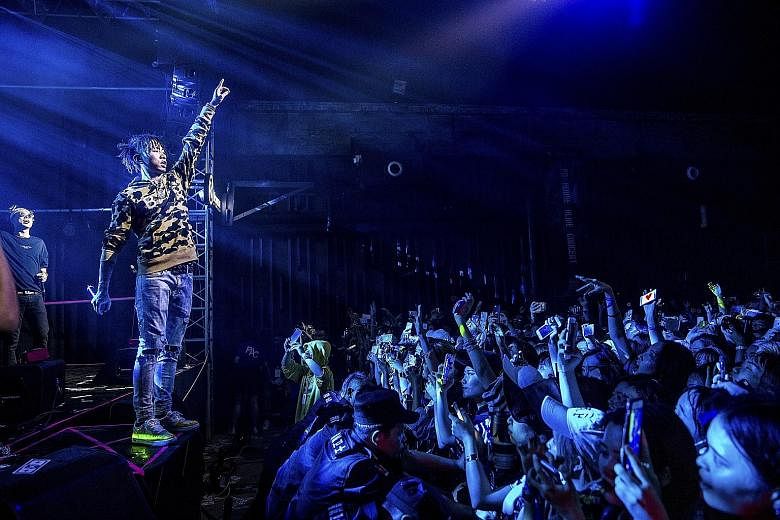CHENGDU (China) • Standing under a phalanx of flashing blue lights, Masiwei gazed down at the sea of waving fans.
Cheers erupted as he threw his head back and called out to the hometown crowd: "Chengduuuu."
Just minutes later, the wiry rapper - of the four-man Chinese rap crew known as the Higher Brothers - was stomping across the stage with his shirt off, tattoos out and short dreadlocks pulled back into a high ponytail.
At the other end of the stage, Dzknow, another Higher Brother, grabbed a fistful of cash and took aim, sending fake bills raining down on the sweaty fans below.
It was a classic rapper move in a not-so-classic setting - a small hip-hop festival in the south-western Chinese city of Chengdu.
Once an underground sub-culture, hip-hop - the music, culture and fashion - has stormed the Chinese mainstream in recent months.
Fans are flocking to nightclubs and music festivals to see their favourite local rappers and DJs perform, while English terms such as flow, freestyle and even dis have made their way into popular urban parlance.
Perhaps nowhere is that more apparent than in Chengdu, a sprawling metropolis of nearly 16 million people that is best known for its pandas and spicy food.
The city has produced a steady stream of prominent hip-hop artists, including Fat Shady, Kafe Hu, Ty and the Higher Brothers, the current breakout stars of the Chinese hip-hop world.
Less than two decades ago, few people in Chengdu had even heard of the term hip-hop, "xiha" in Mandarin, let alone listened to it.
In the late 1990s, when access to the Internet and pirated videos became more widespread, local folk began to discover the genre.
Many were teenagers when they heard artists such as Jay-Z, 50 Cent and Eminem for the first time. Some stumbled on the music through NBA mixtapes; others through watching breakdance, or B-boy, videos.
Demi Zhu, one of the first amateur rappers in Chengdu, recalled hearing DMX and Run DMC in a B-boy video for the first time at 17.
"We had no idea who they were or what they were saying, but we liked the tempo and the feel," said Zhu, now 32. "You could feel their passion."
No one can quite say why hip-hop took hold in Chengdu so early, compared with other Chinese cities.
Local rappers said the Chengdu dialect, with its bouncy rhythm and irregular tones, is versatile in a way that is especially well suited to rap music.
"I use the dialect as a tool when I write verses," said Masiwei. "If I want to achieve a certain flow, I can use Chengdu dialect in one sentence, then English in the next and then standard Mandarin."
But when it comes to writing songs, government censorship is the bane of every Chinese rapper. Local rappers say the unofficial list of sensitive topics is long: politics, drugs, sex, violence, gangsters and explicit language - in other words, many of the themes that have come to define modern hip-hop.
As a result, rappers, like most creative workers in China, find themselves constantly testing the boundaries of what is permissible.
"It's like hip-hop 2.0," Luo Sang, a local DJ and a manager at Nasa, one of Chengdu's first hip-hop nightclubs, said with a wink.
There is one traditional hip-hop obsession that has become a favourite theme among local rappers. "One theme that really resonates here is money," said Andre Alexander, also known as Harikiri, a British music producer and DJ based in Chengdu.
In Made In China, the Higher Brothers' most popular song, for example, Masiwei boasts: "My chains, my new gold watch/Made in China."
The "making it to the top" narrative has become more relevant in recent months since the huge popularity this summer of the new online show The Rap Of China (think American Idol for rappers). Each episode had more than 200 million views and some of the participants are now household names.
Hundreds of fans - mostly women, mostly in their 20s - turned up on a recent Sunday afternoon at a newly built art park in Chengdu to watch the Higher Brothers and others perform.
"Hip-hop lets me express my individuality," said Yang Jinyue, 24, a local DJ, as she sat cross-legged on the grass, sporting a black baseball cap and a skimpy black romper that revealed numerous tattoos.
That fixation with individuality was a sentiment echoed repeatedly throughout the day.
"When it comes to our careers, we've already made the most important decision," said Masiwei, gesturing towards his fellow Higher Brothers. "That was: Should I become a rapper or should I listen to my parents?
"We're all doing what we want to be doing now," he added, as the other members nodded in agreement. "We are living our own lives."
NYTIMES

